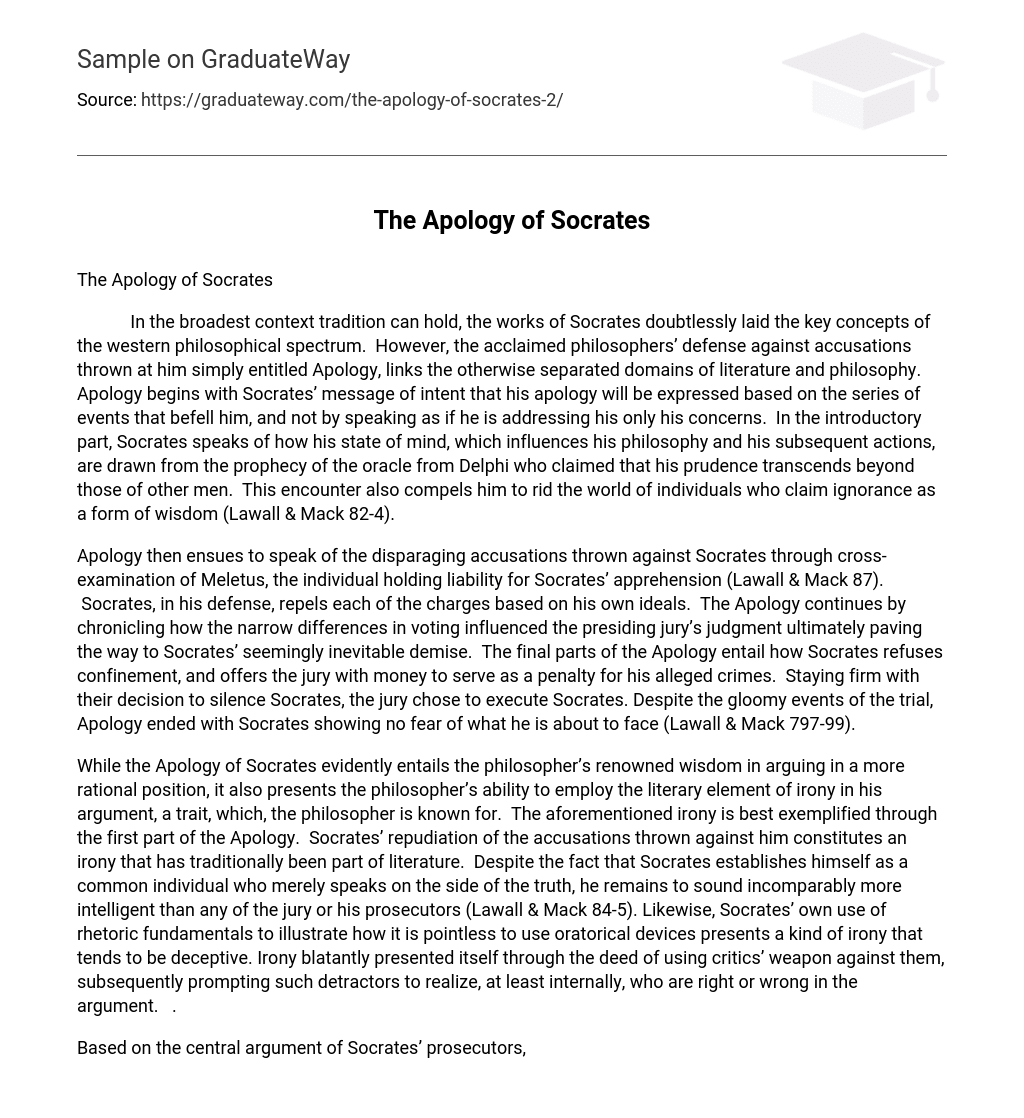In the broadest context tradition can hold, the works of Socrates doubtlessly laid the key concepts of the western philosophical spectrum. However, the acclaimed philosophers’ defense against accusations thrown at him simply entitled Apology, links the otherwise separated domains of literature and philosophy. Apology begins with Socrates’ message of intent that his apology will be expressed based on the series of events that befell him, and not by speaking as if he is addressing his only his concerns. In the introductory part, Socrates speaks of how his state of mind, which influences his philosophy and his subsequent actions, are drawn from the prophecy of the oracle from Delphi who claimed that his prudence transcends beyond those of other men. This encounter also compels him to rid the world of individuals who claim ignorance as a form of wisdom (Lawall & Mack 82-4).
Apology then ensues to speak of the disparaging accusations thrown against Socrates through cross-examination of Meletus, the individual holding liability for Socrates’ apprehension (Lawall & Mack 87). Socrates, in his defense, repels each of the charges based on his own ideals. The Apology continues by chronicling how the narrow differences in voting influenced the presiding jury’s judgment ultimately paving the way to Socrates’ seemingly inevitable demise. The final parts of the Apology entail how Socrates refuses confinement, and offers the jury with money to serve as a penalty for his alleged crimes. Staying firm with their decision to silence Socrates, the jury chose to execute Socrates. Despite the gloomy events of the trial, Apology ended with Socrates showing no fear of what he is about to face (Lawall & Mack 797-99).
While the Apology of Socrates evidently entails the philosopher’s renowned wisdom in arguing in a more rational position, it also presents the philosopher’s ability to employ the literary element of irony in his argument, a trait, which, the philosopher is known for. The aforementioned irony is best exemplified through the first part of the Apology. Socrates’ repudiation of the accusations thrown against him constitutes an irony that has traditionally been part of literature. Despite the fact that Socrates establishes himself as a common individual who merely speaks on the side of the truth, he remains to sound incomparably more intelligent than any of the jury or his prosecutors (Lawall & Mack 84-5). Likewise, Socrates’ own use of rhetoric fundamentals to illustrate how it is pointless to use oratorical devices presents a kind of irony that tends to be deceptive. Irony blatantly presented itself through the deed of using critics’ weapon against them, subsequently prompting such detractors to realize, at least internally, who are right or wrong in the argument. .
Based on the central argument of Socrates’ prosecutors, he is guilty of corrupting the young with unconventional mentalities that do not adhere to the collective beliefs of Athens. If, by the slimmest of chances, the prosecutors have devised an argument that will objectively prove their allegations, death, as a form of punishment, is simply extreme. Primarily, ideas are abstract constructs of the mind, and such constructs can either be accepted or rejected, dependent of a particular person’s judgment. Socrates’ teachings, despite their unorthodox nature in terms of ideology, do not pose as a destructive element to society. Socrates is simply sharing a particular form of wisdom that allows individuals to see and judge things from all sides, instead of the narrow, prejudiced Athenian collective that has destructive tendencies.
Works Cited
Lawall, Sarah, N. and Maynard Mack. “Apology.” in The Norton Anthology of World Literature, Second Edition Volume A: Beginnings to AD 100. New York: W.W. Norton & Company, 2003.





